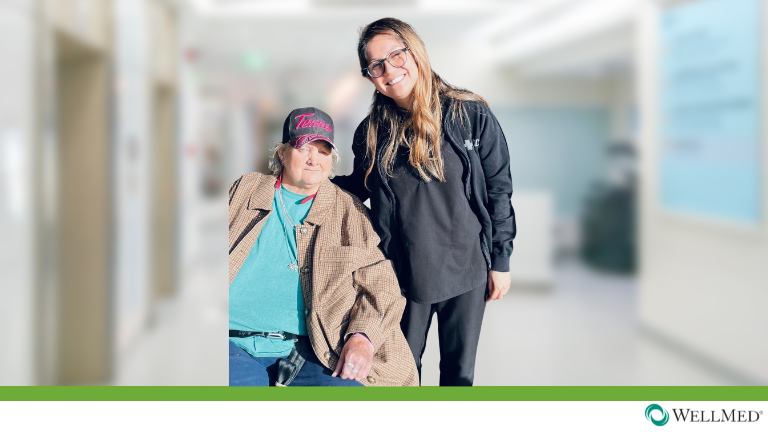Connect with us
Facebook (Opens in new window)
LinkedIn (Opens in new window)
YouTube (Opens in new window)
Instagram (Opens in new window)
TikTok (Opens in new window)
Renae Gaines
Lost in a sea of medications and appointments, patient receives a guiding light

“Our goal is to keep our patients well and out of the hospital.”
USMD patient Renae Gaines is among the sickest of the sick. She is plagued by multiple chronic health conditions, including heart failure and chronic obstructive pulmonary disease (COPD), which require her to manage multiple medications and doctor appointments, and transportation challenges.
As a result of her ailments, the Carrollton, Texas, resident was in and out of the hospital and had trouble keeping track of the many prescription medications she was supposed to take. She lives alone with only a neighbor to look in on her occasionally.
Then Gaines met health care manager Nancy Moreles, RN-BSN, who is based at the USMD Carrollton Clinic where Gaines receives care from Dr. Anna Liza Camungol Lavedan. The team approach to Gaines’ care, coordinated by Moreles, made a world of difference.
“I started working with her a couple of years ago,” Moreles said. “She was a very complex patient with no support, very unstable and her conditions were uncontrolled. We did a deep dive and found several things that needed to happen for her to be more stable.”
It took more than two years, but little by little, the health care team, coordinated by Moreles, worked to address the issues Gaines faced. Moreles’ first step was creating trust.
“Ms. Gaines was so guarded, she wouldn’t open up,” Moreles recalled. “She’d say she was fine, but she wasn’t. It took time to build a relationship with her.”
A top priority was sorting out Gaines’ many medications.
“She wasn’t taking her meds correctly,” Moreles said. “She had about 30 medications on her list, so we analyzed that list and stopped the meds she didn’t need. We also got her a medication dispenser, which helped right away.”
Medication errors are common in patients with multiple high-risk conditions. They often visit multiple doctors on a regular basis, leading to repeat medications or an interaction. With a team approach, this is less likely to happen.
“A home health care team visits her once a month and she goes to the office once a month,” Moreles said. “I stay in close communication with them and her primary care doctor.” Now if Gaines is unsure about taking a medication, she calls Moreles to double check.
Moreles also made sure Gaines had the equipment she needed, including a motorized wheel chair and a trapeze over her bed to help with her mobility.
Today, Gaines’ condition is much more stable, reflected by fewer visits to the hospital.
“In 2022, she had five admits,” Moreles said. “In 2023, it was only two times, and that’s because we recommended she go. Our goal is to keep our patients well and out of the hospital. ”
Gaines’ situation is not a simple one, but with a coordinated team approach to her care, the improvement has been tremendous. Gaines feels the difference, too, something she attributes to Moreles.
“Nancy is wonderful,” Gaines said. “I’m feeling a lot better; I don’t know what I would have done without her.”
Your health is important to us
Interested in learning more about WellMed? We are happy to help. Please contact our Patient Advocate team today.
Call: 1-888-781-WELL (9355)
Email: WebsiteContactUs@wellmed.net
Online: By completing the form to the right and submitting, you consent WellMed to contact you to provide the requested information.
Representatives are available Monday through Friday, 8:00am to 5:00pm CST.
Become a patient
"*" indicates required fields
